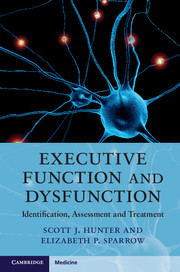Book contents
- Frontmatter
- Contents
- Editor biographies
- List of Contributors
- Preface
- Acknowledgments
- Introduction
- Section I Foundations of Executive Function/Dysfunction
- Section II Executive Dysfunction in the Neurodevelopmental and Acquired Disorders
- Section III Applications
- Chapter 17 Empirical status regarding the remediation of executive skills
- Chapter 18 Educational implications of executive dysfunction
- Chapter 19 Executive functions, forensic neuropsychology, and child psychiatry: opinions, cautions, and caveats
- 20 Reflections on executive functioning
- Appendix 1 Abbreviations used in the book
- Appendix 2 Tests/tasks referenced in the book
- Index
- References
20 - Reflections on executive functioning
from Section III - Applications
Published online by Cambridge University Press: 05 October 2012
- Frontmatter
- Contents
- Editor biographies
- List of Contributors
- Preface
- Acknowledgments
- Introduction
- Section I Foundations of Executive Function/Dysfunction
- Section II Executive Dysfunction in the Neurodevelopmental and Acquired Disorders
- Section III Applications
- Chapter 17 Empirical status regarding the remediation of executive skills
- Chapter 18 Educational implications of executive dysfunction
- Chapter 19 Executive functions, forensic neuropsychology, and child psychiatry: opinions, cautions, and caveats
- 20 Reflections on executive functioning
- Appendix 1 Abbreviations used in the book
- Appendix 2 Tests/tasks referenced in the book
- Index
- References
Summary
It can be argued that EF is the most important factor for successful adaptation to the human world. Although there are differing definitions and models for understanding EF (see Chapter 1), researchers and clinicians agree that intact EF skills are necessary for independently living as a responsible member of society who demonstrates appropriate and self-sustaining behavior. There remains debate regarding whether there is a unitary executive function (singular, comparable to a general factor), a non-unitary group of executive functions (plural), or a multifaceted cluster of separable but correlated executive functions; however, all of the currently considered models agree that EF is complex, and multifactorial in its development and influence.
Executive functioning is complex and difficult to define
The challenge with any complex construct is creating a unitary definition or model that can account for all variations (see Chapter 1 for a review of historical and contemporary models). And, with regard to EF, the predominant definitions are filled with seeming contradictions and a focus on what may seem to be extremes of behavior. For example, a person with intact EF is described as flexible, able to adapt to changes in her environment; at the same time, she is persistent, and able to persevere (without becoming perseverative), and capable of self-monitoring and being strategic. This pattern of contrast within the goals of mental flexibility can be applied to skills such as consideration of a plan or goal, attention, concept, response set, even effort. Intact EF is also associated with being able to inhibit as well as initiate – again, seemingly opposite sides of the EF coin.
- Type
- Chapter
- Information
- Executive Function and DysfunctionIdentification, Assessment and Treatment, pp. 262 - 275Publisher: Cambridge University PressPrint publication year: 2012
References
- 1
- Cited by

